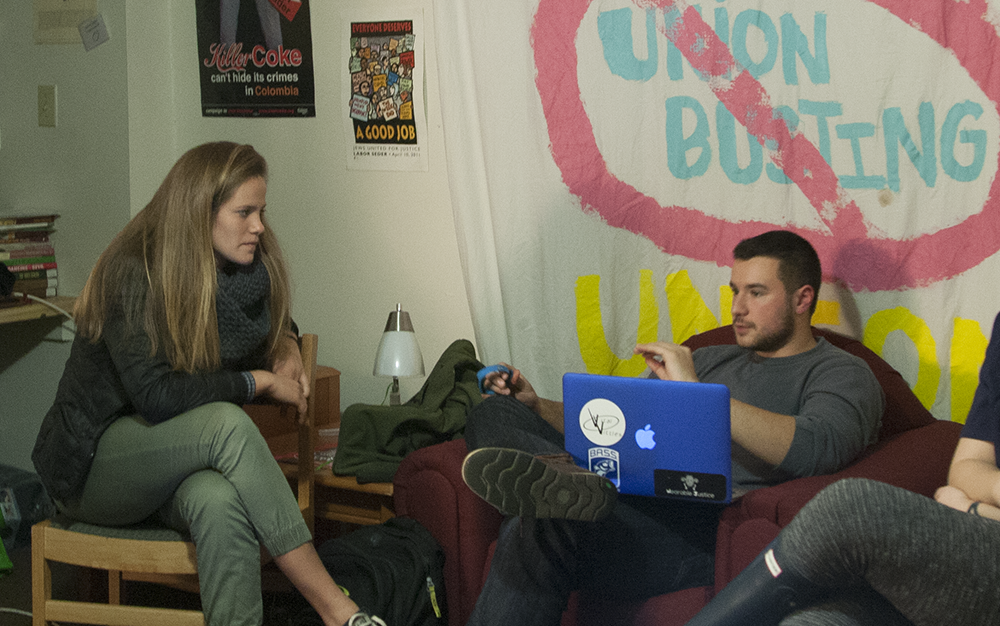
Athletes and Advocates for Workers’ Rights and Wearable Justice held a public forum to discuss questions regarding the university’s relationship with Nike on Wednesday.
Athletes and Advocates for Workers’ Rights and Wearable Justice held a public forum to address questions about their awareness campaign against Nike’s unethical business practices and discussed plans to meet with University President John J. DeGioia Wednesday in the Worker/Student Solidarity Magis Row townhouse.
The event drew 16 attendees – mostly student-athletes – and was attended by professor of theology Kerry Danner-McDonald.
The forum began with a discussion of the letter AAWR sent Nov. 19 to DeGioia outlining the group’s opposition to Nike’s unethical business practices and urging the university to cut ties with the corporation. The letter was received by the president’s office, but the group has not received a response.
The letter comes as a result of athlete and advocate collaboration – sparked after a lecture by anti-sweatshop activist Jim Keady – to address Georgetown’s relationship with Nike. Student-athletes posted multiple images on social media showing athletes wearing university-provided sports apparel with Nike’s logo covered.
AAWR has been in contact with other schools involved in United Students Against Sweatshops, including the University of Washington and Virginia Tech, and is attempting to follow their example of meeting with university presidents. USAS advocates for workers’ rights with students on over 150 campuses nationwide.
CEO and founder of Wearable Justice Jake Maxmin (COL ’17) said the group hopes to meet with DeGioia to start a dialogue with him on the issue.
“The idea is [to sit] down and [start] a dialogue,” Maxmin said. “Coming out and saying that we have been thinking and the Worker Rights Consortium is something very important for workers’ rights around the world, and we want to stand up and support them.”
The group also discussed the timeline of its campaign, highlighting Nike’s recent decision to no longer allow the WRC into its factories. The WRC is an organization that works to monitor international labor rights and the enforcement of the manufacturing code of conduct in the production of collegiate goods. Nike now only allows monitoring by the Fair Labor Association, which is comprised of companies and corporations, along with 208 colleges and universities nationwide. The FLA has received criticism by USAS, stating that much of its funding comes from the very organizations — such as Nike — that are inspected by the organization.
Isabelle Teare (COL ’17), a student-athlete and co-leader of the campaign, noted the importance of informing the Georgetown campus about the WRC and what it does.
“We want to talk to Georgetown and Georgetown students especially, because I don’t think people realize what the WRC is and the fact that [Georgetown pays] the WRC to try to make sure that the conditions under which things are produced are at least somewhat ethical,” Teare said.
Danner-McDonald said the WRC conveys indispensable information.
“The WRC is an important tool, as it allows for some level of transparency and accountability, and even though there is evidence that there needs to be more accountability beyond what the WRC provides, the fact that Nike has withdrawn should be a significant concern for everybody in the Georgetown community,” Danner-McDonald said.
Teare said the group hopes to focus on bringing the WRC into Nike factories, so as to not set a bad example for other companies and their monitoring policies.
“If Nike, who is a massive leader in the apparel industry and also one of the worst in terms of their labor violations, says they are not allowing people to monitor their factories anymore, that sets a precedent,” Teare said. “That starts a ripple effect and then all the progress that people have made goes away. Getting factories monitored was a big step.”
The group hopes to put an emphasis on conscious consumerism, particularly in purchasing apparel and being aware of where it is manufactured. Danner-McDonald noted the importance of increasing transparency for student-athletes.
“I think that if it is indeed accurate that many student-athletes have tried to obtain copies of their contracts and have been denied access to them, then I think that is another issue that everybody should be quite concerned about, as that is a matter of transparency and treating students with integrity,” Danner-McDonald said.
An anonymous student-athlete at the forum spoke about the importance of the movement in making Georgetown students think about what they are buying and wearing. The athletes requested anonymity, citing potential repercussions from the athletics department.
“I think that it is a really great movement to get people reflecting about what they are wearing and who made it,” the anonymous student-athlete said. “It is something that I have never thought too much about before and have already found myself thinking more deeply about my personal purchasing power … I think that the movement is very empowering.”
Another anonymous student-athlete said the forum was an effective space for an open dialogue.
“I think the forum was an awesome place to share ideas and gain different perspectives on the issue, and to just be able to freely discuss what’s going on with other people who care,” the anonymous student-athlete said. “I think that by spreading the word and making as many people aware as possible, we could all really make a difference and that is so exciting to me.”




















